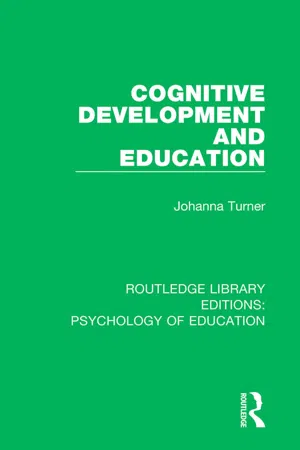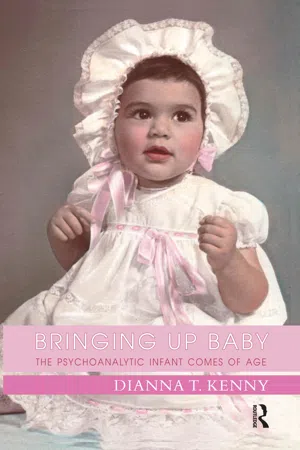Cognitive Development in Infants
Cognitive development in infants refers to the growth and progression of mental processes such as perception, attention, memory, and problem-solving abilities. During the first year of life, infants rapidly develop cognitive skills through experiences and interactions with their environment, laying the foundation for future learning and understanding of the world around them.
7 Key excerpts on "Cognitive Development in Infants"
- eBook - ePub
- Johanna Turner(Author)
- 2017(Publication Date)
- Routledge(Publisher)
...2 Infancy (0–2 years) At any one time the human adult’s knowledge of the world is the result of both external stimuli, potentially detectable by the senses, and an internal reception, recognition and appraisal of such stimuli. Cognitive development is the development of the processes by means of which the sensations received by the senses are categorized and responded to. Such processes result in individual constructions of reality within a context of shared cultural and social meanings. By the time maturity is reached the adult has developed categories of understanding, or ways of interrogating reality, some of which are held in common with all other humans, some with a few others and some, possibly, with no others. One person’s world will be similar to another’s to the extent that both detect and process external stimuli similarly. Maturity marks the culmination of such development, birth its inception. The human infant, as a product of evolutionary adaptation, begins by responding to the perceived environment using pre-existing patterns of response which will both effect subsequent development and themselves be modified by it. The capacities of the newborn infant At birth human infants are ready to start this process of cognitive growth. Their senses are not only able to receive external stimuli, in that they can see, hear, taste, smell and feel, but also they can pay selective attention to just these aspects of events which are of relevance for newborn humans. Recently, it has been suggested (Trevarthen, 1979b) that infants also possess a rudimentary sense of intentionality and interpersonal sharing. If human infants were not able to pay selective attention to stimuli they would be overwhelmed by a barrage of sensations, and indeed this was once believed to be the case (James, 1890). Such a view derived from the empiricist notion that at birth the mind was like a blank slate and would be formed by experience...
- eBook - ePub
Developmental and Educational Psychology for Teachers
An applied approach
- Dennis McInerney, David Putwain(Authors)
- 2016(Publication Date)
- Routledge(Publisher)
...CHAPTER 5 Cognition and cognitive development: infancy to late childhood Introduction In the last two chapters we have considered the physical growth of children from early childhood through to early adulthood. We noted that cranial growth during the early childhood years is very significant and by the age of five years has achieved 75% of its adult size. The development of the brain is directly related to the development of motor coordination and a number of other developmental trajectories. Accompanying this cranial growth is also the development of cognition. Cognitive development is the development over time of the ability to think and reason and to understand the world in which we live. A knowledge of cognitive development is essential for teachers and educators. Does a child think in the same way as an adult? How does a child process information? When can we expect a child to perform particular mental processes? What is intelligence? What is creativity? Can we measure these? What influences cognitive development? These, and many other questions, are of central importance to educators. What is cognition? Broadly, cognition refers to the intellectual activity of an individual, i.e. the mental processes; involving all aspects of thought and perception. As with the development of the physical structures of the body, the major cognitive processes that are inherent in being human, mature in an orderly way in children provided the environment contains the normal experiences of childhood such as social interaction, environmental stimulation, and good diet. In other words, a child in any normal environment will develop a full range of cognitive capacities...
- eBook - ePub
Forensic Psychiatry
Fundamentals and Clinical Practice
- Basant Puri, Ian H. Treasaden, Basant Puri, Ian H. Treasaden(Authors)
- 2017(Publication Date)
- CRC Press(Publisher)
...8 Developmental psychology NATHALIA L. GJERSOE AND CATRIONA HAVARD Introduction Cognitive development Personality Social development Sexual development The child as witness Conclusion References INTRODUCTION Developmental psychology is a discipline that encapsulates the full spectrum of psychological processes throughout the life span. Theories developed as part of this research have important implications not just for our understanding of children’s behavior and growth but also for how we conceptualize the human mind as a whole. Often there are processes so inextricably interwoven and sophisticated in adults that understanding them requires examination from their inception in the developing brain. This chapter focuses on the age range between infancy and late childhood and summarizes theories of children’s cognitive, personality, social, and sexual development, concluding with an outline of current opinion regarding children’s capacities as eyewitnesses. COGNITIVE DEVELOPMENT Even newborns come into the world with a toolkit of basic sensory capacities and biases to attend to specific types of information. This stream of information forms the basis for mental representations—patterns of neuronal activity that refer to aspects of the external world. Developmental cognitive psychology examines mechanisms of change in mental representations throughout the life span. Examining Cognitive Development in Infants and young children requires its own set of methodologies distinct from those used to examine adults. Children have limited communication and -comprehension abilities, disorganized or slow motor responses, and are easily distracted. Traditionally, research into cognitive development utilized naturalistic observation of children’s behavior at different ages and manipulated situations to determine if children’s responses changed in a reliable manner from age to age...
- eBook - ePub
- Margaret Harris, Gert Westermann(Authors)
- 2014(Publication Date)
- Psychology Press(Publisher)
...Chapter 4 Cognitive development in infancy DOI: 10.4324/9781315867212-4 Contents 4.1 The Development of Categorisation 4.2 Object Processing 4.3 Understanding Numerosity 4.4 Core Knowledge 4.5 Summary After reading this chapter you will be able to characterise the main aspects of infant cognitive development describe the A-not-B task and discuss different explanations for infants’ behaviour in this task explain the development of object categorisation in infants discuss the controversy in early cognitive development critically evaluate different interpretations of looking time data obtained with infants. The period from birth to 24 months sees dramatic changes in the infant. The relatively helpless newborn with very little voluntary motor control has, by 24 months, developed into a confident toddler who runs around, climbs on chairs and playground slides, enjoys looking at picture books and computers, sings and dances, has an opinion on what music to listen to, what food to eat and what clothes to wear, and often has a vocabulary of over 200 words. This period of such profound change and development has become of great interest to psychologists, particularly since the methods described in Chapter 1 have been developed to study children’s knowledge and abilities during this early period. Traditionally the term ‘cognitive’ has been used to refer to such abilities as reasoning and problem solving and to the acquisition and representation of knowledge. This use of the term came from the idea that mental life can be separated into sensing, thinking and acting: information from the world is perceived, these perceptions are processed, and an action is performed. Cognition was focused on the processing stage – thinking. While many researchers still take this view others have come to the conclusion that it can be very hard to separate perception and action from cognition, and that cognition is firmly grounded in both sensing and acting (Smith & Sheya, 2010)...
- eBook - ePub
- Barbel Inhelder, Denys de Caprona, Angela Cornu-Wells, Barbel Inhelder, Denys de Caprona, Angela Cornu-Wells(Authors)
- 2013(Publication Date)
- Psychology Press(Publisher)
...10 Cognition in Its Relationship to Total Development in the First Few Years of Life Sybille K. Escalona Albert Einstein College of Medicine, New York My primary research interest has been and still is to elucidate developmental processes in infancy and early childhood. Most of our research has tried to take into account that what develops is not cognition or perception but children who perceive, who cognate, who feel, who simultaneously act upon the environment and are acted upon by the social and material forces and conditions in which they grow and to which they must adapt. The fascination lies with the manner in which diverse conditions, events and intrinsic characteristics combine and interact in such a way as to result in lawful developmental sequences that characterise the species as a whole and yet ensure enormous individual differences; no two children develop in the same manner. Study of the intertwining of cognitive, affective and social components of development requires factual knowledge and workable theory in all of these areas. Decades of research by Piaget, Inhelder and the entire Geneva group have created an extraordinarily explicit, systematic and empirically based theory of cognitive development. For the area of personality development the equivalent does not exist. However, psychoanalytic ego psychology deals with what Piaget called affectivity in structural and dynamic terms. In its own way it maintains a close connection with concrete and observable phenomena. As Greenspan (1979) has described in some detail, an affinity between Piagetian theory and psychoanalysis exists, despite enormous differences in the two approaches...
- eBook - ePub
Bringing Up Baby
The Psychoanalytic Infant Comes of Age
- Dianna T. Kenny(Author)
- 2018(Publication Date)
- Routledge(Publisher)
...Piaget argued that thought precedes language in the early stages of development and that the child’s language development is dependent on his/her level of cognitive development. In other words, development in the use of language reflects underlying development in cognitive capacity. Table 6 summarises the four stages of cognitive development in Piaget’s theory. All perceptual and cognitive theories of development assume that children are born with some capacity to process information. The newborn is capable of perceiving stimulation; his senses—vision, hearing, touch, taste, and smell—are all operating to some degree. Reflexes, such as the eye blink or the knee jerk are also present at birth and are automatic responses to stimulation. More complex reflexes such as rooting, sucking, and swallowing are needed for survival, since they are co-ordinated in the act of obtaining sustenance from the breast. It is through these sensory and reflexive capacities that infants begin to interact with their environments. Piaget called this first stage of development the sensorimotor stage, to reflect his view that children solve problems using their sensory systems and motoric activity rather than the symbolic processes (including language) that characterise the other three major periods of development. Through repeated activities such as sucking and grasping, the infant gradually develops schemas or organised patterns of behaviour. These schemas become organised into more complex schemas and a process of adaptation occurs that allows information to be assimilated into the new schema or to be accommodated in the event that new knowledge replaces old, less appropriate schemas for the new object. Feedback from the environment determines which schemas are maintained and elaborated and which fade into disuse...
- eBook - ePub
- Peter Mitchell, Fenja Ziegler(Authors)
- 2013(Publication Date)
- Psychology Press(Publisher)
...Chapter 3 DOI: 10.4324/9780203736357-3 Contents Introduction Stages of cognitive development Piaget’s explanation of cognitive development Traditional learning theory as a contrasting explanation of development A supplement to Piaget’s theory: Self-centered adolescents Summary The development of thinking 3 Chapter Aims To introduce Piaget’s theory of cognitive development. To detail Piaget’s stages. To detail the evidence that lends support to Piaget’s stage theory. To present the mechanism that Piaget posited as responsible for cognitive development. Introduction The discipline concerned with studying the development of thinking is cognitive developmental psychology. The word “cognitive” refers to knowledge, but not necessarily according to the common meaning of the word. When people talk about knowledge, they usually mean the kind of information useful for answering questions in games such as The Weakest Link or Who Wants to be a Millionaire, or in order to do college exams. In contrast, cognitive developmentalists think of knowledge as referring to understanding about things. You might have noticed a child aged around 5 years speaking on the telephone about things only he can see: He seems to overlook the fact that the person he is speaking to is in a completely different location and cannot see the same things. Perhaps this is a sign that the young child is incapable of putting himself in someone else’s shoes. In the broadest sense, it is tempting to suppose that the child does not understand that other people can have different perspectives. Cognitive developmentalists look at particular difficulties children have, such as poor communication ability, and then draw general conclusions about their underdeveloped knowledge of the world...






